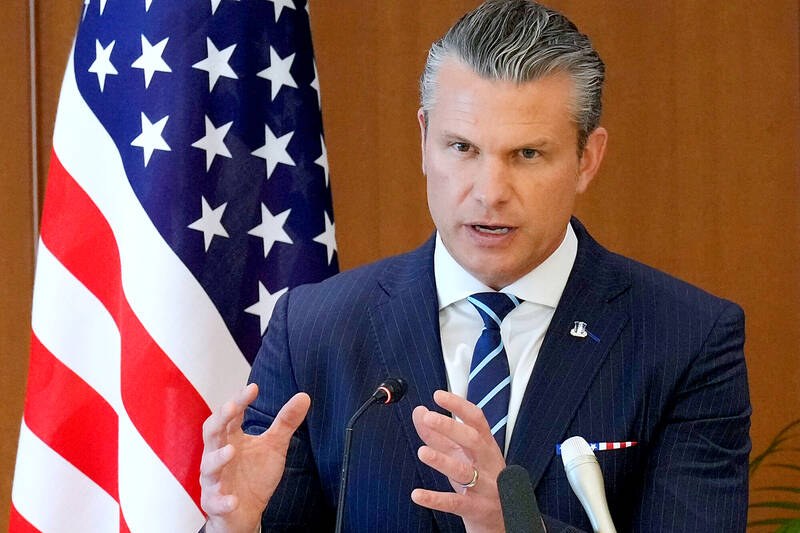US Secretary of Defense Pete Hegseth yesterday voiced concerns in talks with Chinese Minister of National Defense Dong Jun (董軍) about Beijing’s naval activity around Taiwan and the South China Sea, citing its impact on US security partners in the Indo-Pacific region.
The two talked on the sidelines of a gathering of defense chiefs from ASEAN in Kuala Lumpur.
“I highlighted the importance of maintaining a balance of power in the Indo-Pacific,” Hegseth wrote on social media. “United States does not seek conflict, it will continue to stoutly defend its interests and ensure it has the capabilities in the region to do so.”

Photo: Bloomberg
Dong told Hegseth the US should exercise caution in its words and actions on the Taiwan issue and unequivocally oppose “Taiwan independence,” and stressed that the reunification of China and Taiwan is an “unstoppable historical trend,” a Chinese government statement quoted the defense minister as saying.
The meeting was the first high-level encounter between China and the US after US President Donald Trump’s summit with Chinese President Xi Jinping (習近平) in South Korea on Thursday, where the two broadly agreed to reduce trade tensions sparked by US tariffs and to stabilize relations between the world’s two largest economies.
Trump said that Taiwan did not come up in his talks with Xi.
Hegseth has been lobbying US allies and security partners in the Indo-Pacific region for months to boost their defense spending and push back against China’s assertiveness in the region, while warning that greater urgency is needed to prepare for a potential invasion of Taiwan by Beijing.
Hegseth has been touring Asia and is scheduled to meet other defense ministers from ASEAN countries. He met Japanese Minister of Defense Shinjiro Koizumi in Japan during the Asia trip, where he spoke about the threat both countries see from China and the importance of US-Japan cooperation in deterring Beijing.
The US military’s Indo-Pacific Command has issued an order this week to stage a “show of force” against what the Trump administration sees as Chinese aggression in the South China Sea, CBS News reported, citing sources it did not name.
It is unclear if the operation would actually take place, the sources told the TV network.

The US government has signed defense cooperation agreements with Japan and the Philippines to boost the deterrence capabilities of countries in the first island chain, a report by the National Security Bureau (NSB) showed. The main countries on the first island chain include the two nations and Taiwan. The bureau is to present the report at a meeting of the legislature’s Foreign Affairs and National Defense Committee tomorrow. The US military has deployed Typhon missile systems to Japan’s Yamaguchi Prefecture and Zambales province in the Philippines during their joint military exercises. It has also installed NMESIS anti-ship systems in Japan’s Okinawa

‘WIN-WIN’: The Philippines, and central and eastern European countries are important potential drone cooperation partners, Minister of Foreign Affairs Lin Chia-lung said Minister of Foreign Affairs Lin Chia-lung (林佳龍) in an interview published yesterday confirmed that there are joint ventures between Taiwan and Poland in the drone industry. Lin made the remark in an exclusive interview with the Chinese-language Liberty Times (the Taipei Times’ sister paper). The government-backed Taiwan Excellence Drone International Business Opportunities Alliance and the Polish Chamber of Unmanned Systems on Wednesday last week signed a memorandum of understanding in Poland to develop a “non-China” supply chain for drones and work together on key technologies. Asked if Taiwan prioritized Poland among central and eastern European countries in drone collaboration, Lin

BACK TO WORK? Prosecutors said they are considering filing an appeal, while the Hsinchu City Government said it has applied for Ann Kao’s reinstatement as mayor The High Court yesterday found suspended Hsinchu mayor Ann Kao (高虹安) not guilty of embezzling assistant fees, reducing her sentence to six months in prison commutable to a fine from seven years and four months. The verdict acquitted Kao of the corruption charge, but found her guilty of causing a public official to commit document forgery. The High Prosecutors’ Office said it is reviewing the ruling and considering whether to file an appeal. The Taipei District Court in July last year sentenced Kao to seven years and four months in prison, along with a four-year deprivation of civil rights, for contravening the Anti-Corruption

NO CONFIDENCE MOTION? The premier said that being toppled by the legislature for defending the Constitution would be a democratic badge of honor for him Premier Cho Jung-tai (卓榮泰) yesterday announced that the Cabinet would not countersign the amendments to the local revenue-sharing law passed by the Legislative Yuan last month. Cho said the decision not to countersign the amendments to the Act Governing the Allocation of Government Revenues and Expenditures (財政收支劃分法) was made in accordance with the Constitution. “The decision aims to safeguard our Constitution,” he said. The Constitution stipulates the president shall, in accordance with law, promulgate laws and issue mandates with the countersignature of the head of the Executive Yuan, or with the countersignatures of both the head of the Executive Yuan and ministers or